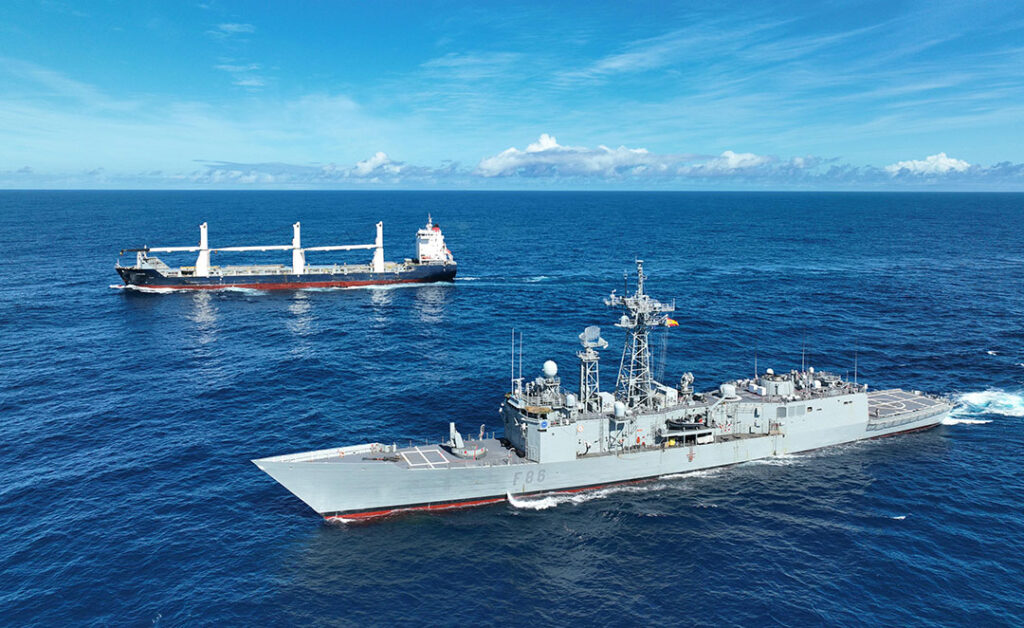ADF STAFF
Gun-wielding pirates in two small boats attacked a Liberian-flagged cargo ship, the Basilisk, as it sailed about 380 nautical miles east of Somalia on May 23.
Pirates fled as the Spanish warship Canarias responded. Canarias crew members treated the Basilisk’s captain, who was shot in the arm, according to Ambrey, a maritime risk management firm. The Canarias is attached to the European Union Naval Force Somalia (EUNAVFOR) Operation Atalanta.
Less than two weeks earlier, Somali pirates carrying Kalashnikov-style rifles and rocket-propelled grenades attacked the Marshall Islands-flagged oil tanker, Chrystal Arctic, in the Gulf of Aden. A gunfight ensued, and the pirates fled in a small ship.
An Italian frigate, the Federico Martinego, also attached to Operation Atalanta, seized the six pirates hours later, according to EUNAVFOR, which has reported the presence of two or more pirate groups off the Somali coast.
According to the International Chamber of Commerce’s (ICC) International Maritime Bureau (IMB), 33 incidents of piracy and armed robbery against ships were recorded worldwide in the first three months of 2024, up from 27 incidents for the same period in 2023. During that time, 35 crew members were held hostage, nine were kidnapped and another threatened.
Somali piracy incidents have also increased as international navies leave waters around Somalia to protect against repeated attacks by Yemen’s Houthi militia in the Red Sea and other regional waters.
There were five Somali piracy incidents in the first quarter of 2024, compared to zero incidents for the same period last year, according to the IMB.
Increased piracy also is fueled “by local drivers, such as resentment of illegal foreign fishing and an apparent partnership between pirates and jihadist group al-Shabaab,” wrote analysts at Risk Assistance Network + Exchange (RANE), a risk intelligence platform. Somali pirates are known to use hijacked fishing trawlers in their attacks.
Some observers believe al-Shabaab militants in Somalia’s northern Sanaag region reached a deal to protect pirates in exchange for 30% of ransom proceeds and a cut of any loot, Emirati newspaper The National reported.
The deal could provide al-Shabaab with critical funds after the Somali government clamped down on its other illegal money sources and froze its bank accounts. The terrorists also are suspected of negotiating with pirates and Houthi rebels to acquire weapons.
Local elections in Somalia’s Puntland region in January also may have acted as a temporary driver behind resurging pirate attacks, according to RANE. During election season, security forces left coastal security positions to police the inland, creating a security vacuum off the region’s coast.
Pirates are particularly active off the coastal town of Eyl in Puntland, which al-Shabaab controls.
The converging Somali pirate and Houthi attacks are disrupting global trade. The waterways off Somalia are some of the world’s busiest shipping lanes. Every year, about 20,000 vessels pass through the Gulf of Aden on their way to and from the Red Sea and the Suez Canal — the shortest maritime route between Europe and Asia.
The attacks, which often include ransom demands, have caused prices for armed security guards and insurance coverage to rise, five shipping industry representatives told Reuters.
“The resurgence of Somali pirate activity is worrying, and now more than ever it is crucial to protect trade, safeguard routes and the safety of seafarers who keep commerce moving,” ICC Secretary-General John W.H. Denton said on the organization’s website. “All measures to ensure the uninterrupted free flow of goods throughout international supply chains must be taken.”
Piracy reached its peak in Somalia in 2011 when Somali pirates launched 212 attacks, but only five attacks were recorded between 2017 and 2020. The lull was attributed to coordinated anti-piracy naval operations, safety measures such as armed guards on ships, and increased prosecution and imprisonment of pirates.

